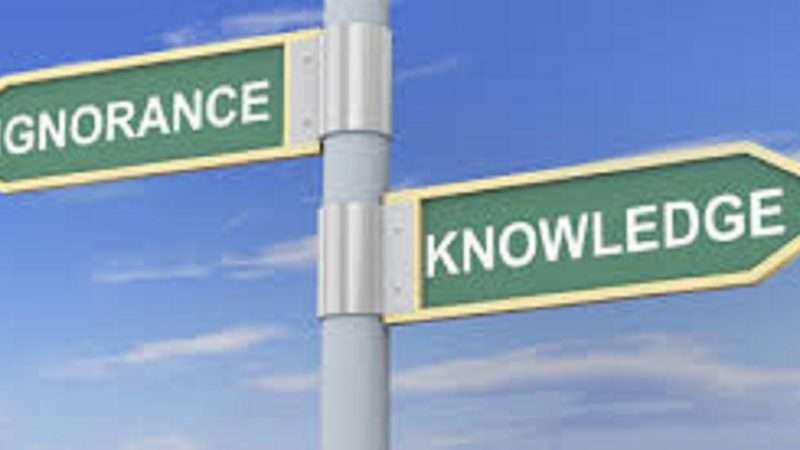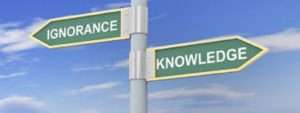

Many believe that political ignorance and misinformation have gotten worse in recent years, with the rise of the internet and social media, and its exploitation by populist political movements, conspiracy theorists, and others. But evidence supporting the idea that the public is more ignorant and more prone to misinformation today than in earlier eras is actually quite weak.
Recent articles by libertarian-leaning economist Tyler Cowen and liberal political commentator Matthew Yglesias provide helpful overviews of much of the available evidence on this. On the whole, they are right to conclude that these problems haven't gotten significantly worse in recent years than was true in the past. But that doesn't mean we can breathe a sigh of relief about public ignorance and misinformation. Rather, we should understand that political ignorance and biased evaluation of information have been serious problems all along - even when pundits and academics were less focused on them than today.
Cowen pushes back on the idea that the Covid era has seen an unusually great degree of misinformation by reminding us of past history when things were as bad or worse:
It's hard to measure misinformation over time. But the premise that there was ever a golden age of accurate information, especially about public health, is suspect.
I just turned 60, so my youth is now fairly distant. Still, I can recall debates about smoking: not so much whether it was bad for you — that science was established, and the federal government had already initiated an anti-smoking campaign — but whether it was really all that bad. And I'm not talking about the occasional cigarette, but one or two packs a day. The scientific knowledge wasn't nearly as socially salient as it is today, and there were many millions more smokers. That meant social opinion was invariably somewhat split….
Overall, I am genuinely unsure that misinformation about public health has become worse in my lifetime. My uncertainty is only strengthened when I do a reality check of how much general public misinformation there has been over the last six decades. A lot of experts and members of the public used to think the economy of the Soviet Union was just fine. They thought the Vietnam War was OK. They saw Nixon's wage and price controls as justified.
Cowen's list of examples can easily be extended. For example, there is a long history of anti-vaxxerism on both left and right. Yglesias notes some examples in his article.
Moving beyond public health, voter ignorance and misinformation have been serious problems for as long democracy has existed, all the way back to ancient Greece. Trump's "Big Lie" about the 2020 election is a notable and dangerous example of the power of misinformation today. But it is no worse than widespread belief in the "stab in the back" myth of World War I, which played a major role in the Nazis' rise to power during the Weimar Republic.
More generally, fascism and communism both achieved widespread popularity in the age of what we now consider traditional print and broadcast media; and advocates of both effectively exploited public ignorance in a variety of ways. Nothing that has happened in the age of Twitter and Facebook has - so far, at least - been anywhere near that bad.
Yglesias goes over some evidence indicating that political knowledge levels have remained roughly stable over the last two to three decades. He also points out (correctly) that many believers in conspiracy theories actually follow political issues more closely than most, and thus may in some ways be better-informed than others. But he goes wrong in arguing that people are likely actually better-informed than in the past, and that increasing political knowledge would do little good, because it cannot resolve difficult policy issues.
It is true, as Yglesias notes, that the internet has made accurate information on many issues more easily available than ever. But most voters have made little or no effort to take advantage of that. As Yglesias himself concedes elsewhere in the article, public knowledge of basic facts about politics has changed very little in recent decades, remaining at stably low levels. Most of the public continues to be ignorant even about very simple things, like the structure of government, how the federal government spends its money, and much else, besides.
Yglesias is right to emphasize that there are some difficult issues where increasing public knowledge may not do much to improve policy, because even the most knowledgeable of experts are deeply divided on what to do. But it is also the case that there are important issues where the evidence is strongly on one side or another, and there is considerable cross-ideological agreement among experts. Examples include exclusionary zoning (where evidence overwhelmingly supports the conclusion that cutting back would greatly increase economic growth and expand opportunity for the poor), and immigration - where it similarly supports the position that greatly expanded immigration would have huge benefits, including for natives.
In both areas, the potential gains are huge and there is broad expert agreement on that point. And, on both, public ignorance is one of the main obstacles to beneficial change. Most of the public is either unaware of the huge gains that can be achieved, or (in some cases) actually believes that liberalization would be harmful (e.g. - falsely believing that immigration increases crime rates, or that dropping zoning restrictions would only benefit rich gentrifiers).
I hasten to add that there is not an expert consensus on going as far with these issues as I would (all the way to near-total abolition of zoning, and a presumption in favor of open borders immigration policy). But there is broad expert agreement on the direction of change - the need to significantly liberalize both zoning restrictions and barriers to migration - even if there is much less consensus on the optimal place to stop. To his credit, Yglesias himself has done much to focus attention on both issues, including in his recent book One Billion Americans. But he overlooks the role of public ignorance in making the situation much worse than would otherwise be the case.
And these are far from the only issues where public ignorance causes serious trouble. Other examples include our looming fiscal crisis (where most of the public doesn't understand where federal money goes), free trade (where public opinion often backs protectionist policies at odds with centuries of evidence and basic economic theory), and much else.
We can think of such issues as "low-hanging fruit" where policy can be greatly improved if only public ignorance were not such a serious problem. Even if there would still be disagreement over the ideal policy in these areas, we could at least eliminate a lot of currently popular options that cause great harm.
Yglesias is also only partly right in suggesting that knowledgeable voters aren't necessarily better, because conspiracy-mongers are often highly knowledgeable, in a sense. It is true that such people know a lot, in the sense of learning large amounts of facts. But they also tend to be highly biased in their evaluation of political information. The problem of political ignorance actually has two dimensions: what scholars call "rational ignorance" and "rational irrationality." I recently summarized these dynamics and their relationship to conspiracy theories here:
Because there is so little chance that any one vote will make a difference to the outcome of an election, most people are "rationally ignorant" about politics and government policy. They spend little time seeking out relevant information, and are often ignorant of even basic facts about the political system They thus underestimate the extreme difficulty of planning, coordinating, and covering up large-scale conspiracies. Birtherism, trutherism, and Covid conspiracy theories are all more prevalent among people with relatively low levels of education and political knowledge. The less you know about government, the easier it is to believe that events are controlled by a shadowy cabal of ultra-competent evil-doers who can skillfully cover up their misdeeds.
But the popularity of conspiracy theories is also boosted by partisan and ideological bias. In assessing political information, most people act not as objective truth-seekers, but as "political fans" who tend to overvalue any claims that cohere with their preexisting views, and downplay or ignore any that cut against them. Much like sports fans, who tend to be biased in favor of their preferred team and against its rivals, political fans are highly biased in favor of their preferred party and ideology, and against its opponents.
Most conspiracy-mongers are extreme examples of "political fans," who learn about politics more for the purpose of enhancing their fan experience, than to get at the truth. Such fan behavior is often rational; given the low odds of any one vote making a difference, many of those who seek out political knowledge do so for reasons other than figuring out the truth. And when truth-seeking isn't the goal, it is perfectly rational to be highly biased in your evaluation of information - a phenomenon economist Bryan Caplan dubbed "rational irrationality."
Most successful politicians are well aware of the problems of ignorance and irrationality, and work hard to exploit it. Donald Trump's victory in the 2016 election owed much to his exploitation of public ignorance and bias on immigration and trade. But more conventional politicians, such as Barack Obama, also often exploit ignorance for their benefit. As I have stressed many times (most recently here), political ignorance and biased evaluation of evidence are not limited to one side of the political spectrum, or to the supporters of a few especially egregious politicians. They systematically reduce the quality of government all round, on both left and right.
After controlling for other relevant variables, such as partisanship, ideology, race, income, and others, scholars such as Caplan and Scott Althaus find large differences in policy views between more knowledgeable voters and more ignorant ones. Controlling for factors like partisanship and ideology suggests that much of this difference reflects real effects of increased knowledge, not cognitive biases.
The fact that the problems of ignorance and bias are not new, and may not be much worse now than in the past, is no reason to discount them. Moreover, in two significant respects, things are worse than in the past. First, the growing size, scope, and complexity of government increases the knowledge burden on voters, and expands the range of issues on which public ignorance could have a negative impact. I discuss this in more detail in my book Democracy and Political Ignorance. Second, people may be more susceptible to bias in the evaluation of information in periods of high partisan polarization, like the present.
I do not mean to suggest that increased political knowledge is always good. In Chapter 2 of my book, I discuss some unusual scenarios where it actually causes harm. Examples include situations where increased knowledge enables people with evil values to accomplish their nefarious ends more fully, or when ignorance on one issue happens to offset the potentially harmful effects of ignorance on another. But, on the whole, such cases are relatively unusual exceptions that prove the rule.
In sum, there is good reason to worry about public ignorance and the influence even if the problem isn't significantly worse than in the past. The harder question is what to do about it.
That difficult subject must be left for another time. But, for those interested, I have written about it in detail in many previous writings, including my book, and this recent article in National Affairs. There is, of course, also a large literature on it by other scholars, many of whom advocate very different approaches from mine.
UPDATE: I made some related points in a 2019 post on "Why the Demand for Fake News is a Far More Serious Problem than the Supply."
The post Are Public Ignorance and Misinformation Getting Worse? appeared first on Reason.com.







